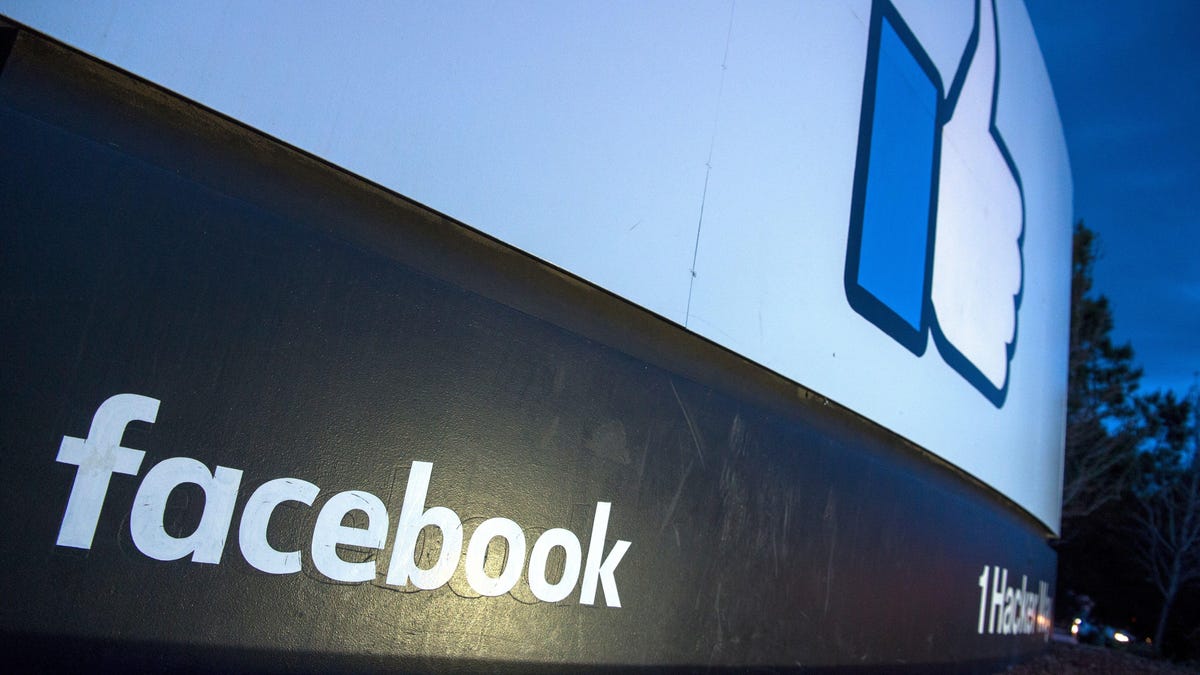Facebook COO Sandberg and CTO Schroepfer continue apology tour
But at the Recode Code Conference, they're facing an increasingly unforgiving audience.

The sign outside Facebook's headquarters in California.
"Why wasn't anyone fired over Cambridge Analytica ?"
That's how the interview Facebook COO Sheryl Sandberg and CTO Mike Schroepfer started at Recode's Code Conference in Rancho Palos Verdes, California began. The pair came to the stage after months of scandal over a Trump-connected political consultancy called Cambridge Analytica was said to have improperly bought up to 87 million people's Facebook profiles, leaked from an app developer that reportedly conned about 187,000 people to share their friend's information years ago.
While Sandberg said the company's leadership is ultimately responsible for the scandal, she also repeated a common refrain from CEO Mark Zuckerberg that Facebook was in ways a victim in all this too. "I don't think we were focused enough on the bad," she said. "In hindsight it always looks obvious."
The pair repeated details from two weeks ago about how Facebook has come up with ways to detect bad behavior through artificial intelligence, while discussing how the company is changing its culture to avoid these issues int he future.
"We've made more progress over the last six months than I thought was possible," Schroepfer said. "It's the biggest cultural shift I've seen it the 10 years I've been there."
Sheryl Sandberg, Facebook's COO
Sandberg's and Shroepfer's appearance at the conference is the latest in Facebook's ongoing efforts to apologize for its role in the scandal, and to convince us how it's changing. Zuckerberg too has appeared before EU regulators, three committees in Congress, and done numerous media interviews over the past couple months.
At each appearance, the company has tried to send the same message: It's sorry, it screwed up, it's going to be better.
"We're learning from our mistakes and taking action," Sandberg said. "We're also being very humble about this."
An issue of trust
At its heart, the controversy wasn't just what has become one of the biggest leaks in Facebook's history. It was also about Facebook's own lack of action in the years since finding out its user's data had been mishandled three years ago.
The chain of events reads like a case study in bad behavior: When Facebook found out about the data leak, it merely asked the app developer and Cambridge Analytica to sign documents certifying they'd deleted the data, and then didn't follow up or disclose the leak to the public. Instead, the company then threatened to sue reporters pursuing the story years later, and ultimately acknowledged everything that had happened just before twin stories from The New York Times and Guardian's Observer publications published their bombshell reports in March.
For a company already under scrutiny for initially dismissing that its social sharing tools had been manipulated to spread misinformation by Russian-linked propagandists during the 2016 election, the Cambridge Analytica scandal further fueled people's concerns about how Facebook operates and how seriously it takes its responsibility as the world's largest social network.
"The days of tech not being responsible for what goes on our platforms is over," Schroepfer acknowledged.
As to how the company will regain user's trust, Sandberg said Facebook is still considering whether to offer an ad-free version of Facebook people can pay for instead.
She also acknowledged that while Facebook is trying to fix the problems Cambridge Analytica raised, it also recognizes that it won't ever know how extensive the damage really is.
"I learned we needed to invest more to see the threats," she said."We sit here knowing what today's problems are, feeling more responsibility and knowing we need to protect people."
Cambridge Analytica: Everything you need to know about Facebook's data mining scandal.
iHate: CNET looks at how intolerance is taking over the internet.



